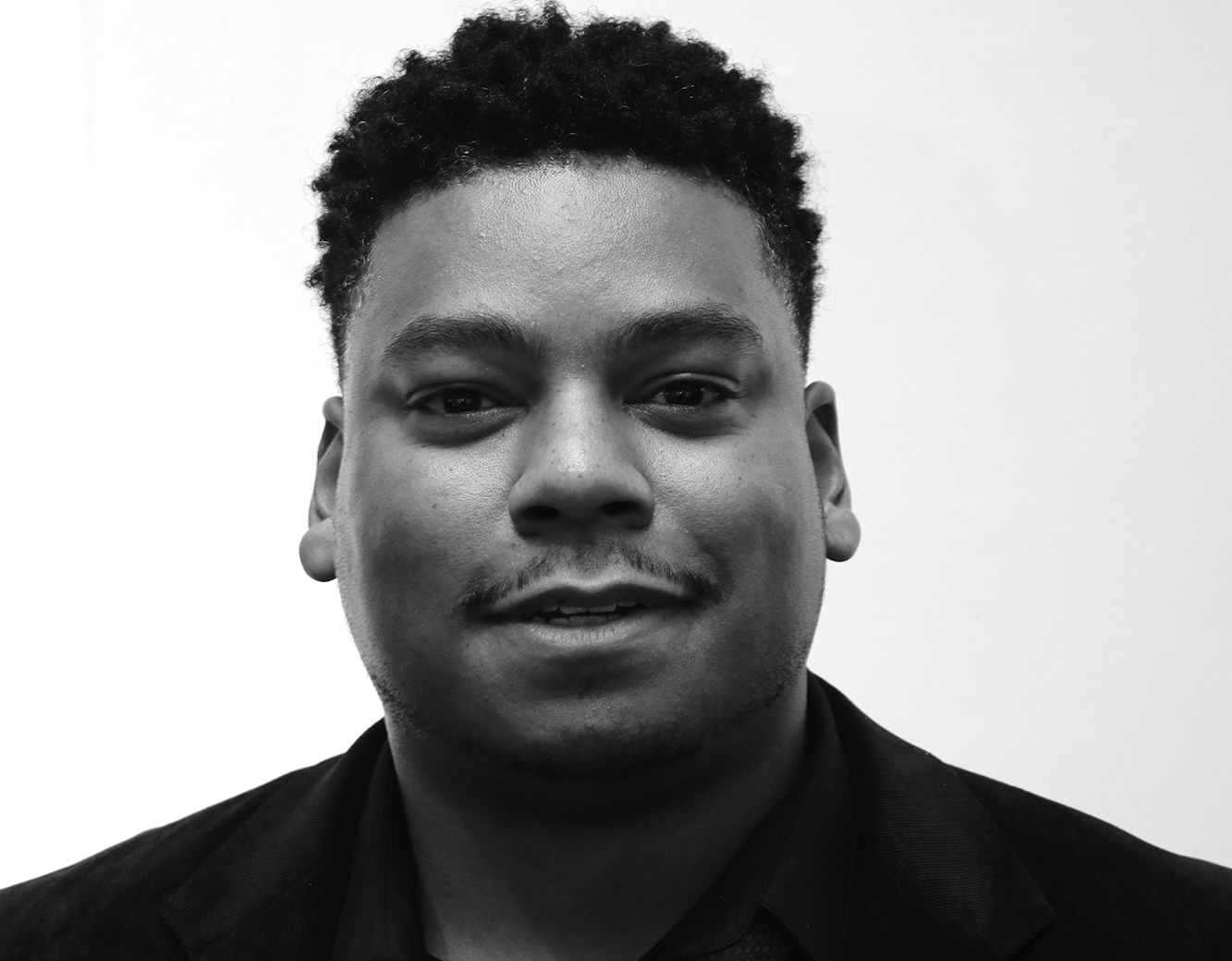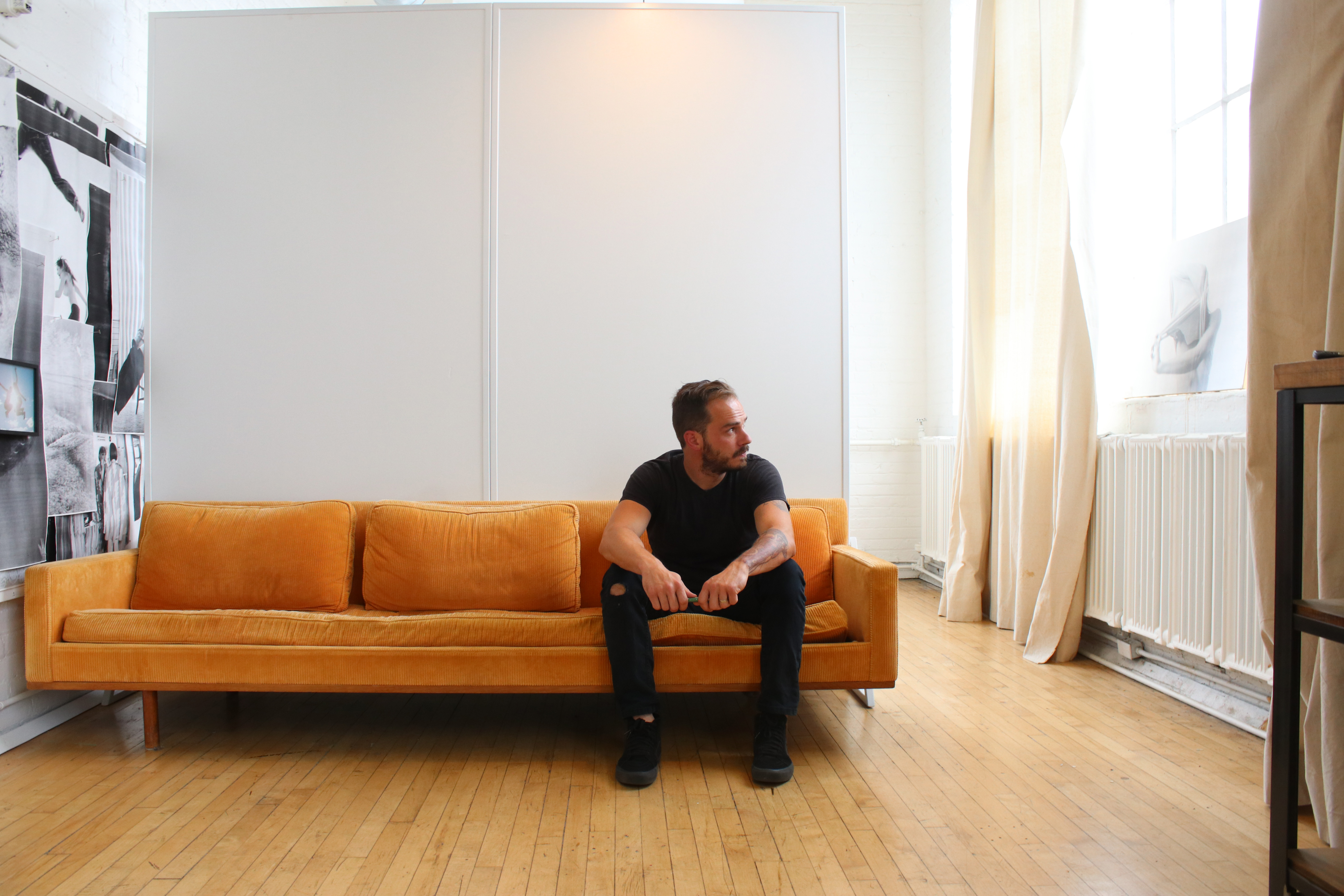One man show

By Becky Raspe
When Robert Banks calls himself a filmmaker, he means it literally.
Born and raised in Cleveland’s Hough neighborhood, the 55-year-old self-described physical film-only auteur has had an artistic journey only he could have, amalgamated into a career of love, loss, shame, risk-taking, failure, hope and growth. Also peppered into that experience is a no-bullshit attitude – something he learned over the years after he first picked up a film camera in high school, and again following a short stint at the Cleveland Institute of Art and service in the United States Air Force.
Most recently, Banks’ first feature-length film, “Paper Shadows,” made the rounds on the film festival circuit, premiering in a finished digital format at the 2020 Chicago Underground Film Festival, where it won the Audience Award. As his over three-decade career has included more than 30 short films, like his most famous, “X: The Baby Cinema” in 1992, it’s not the first time his work has seen well-known festivals like Sundance and SXSW.
But making “Paper Shadows” felt meaningful in a different way, Banks tells Canvas, it felt like a full-circle feat. “Paper Shadows” may have been his first completed feature film, but that wasn’t for lack of trying. As other projects fell through, the concept of the film ruminated until he felt no other option than to put the concept to celluloid.

“It officially took me seven years to make,” Banks says. “‘Paper Shadows’ was the beginning of me reaching the point I am at now. The project officially started in 2010, and production started on Jan. 1, 2011. The film wrapped in its first stage in December 2014. There were some things I liked, and didn’t like, so I went back once again, and that cut finished in 2016. Over two more years, my intern team and I cut it digitally to submit to festivals. But, the end goal is to finish this on film.”
“Paper Shadows” was an “extreme, ultimate film school” experience for him, Banks says. The film centers on living and working in Cleveland as an artist, specifically as a member of the Black community and trying to make things happen while accepting there is no true fairness in the film industry.
“It’s an essay, a collage with no real plot about being in this blue-collar rust belt with all of this creativity bottled up within you and having these delusions about success where you have to play dirty and cause chaos to get where you need to be,” Banks says. “Everything that I felt from when I got out of the service to this point, where I am now, is in this film. By finishing this, this was also my way of saying, ‘You guys wanted an angry Black man? You’re going to get him with this film.’”

Inspiration in Hough
Like many other people, artists or otherwise, Banks can’t help but be a product of his childhood, which he says is evident through all of his projects.
Growing up as his father Robert Banks, Sr.’s only son, with his mother’s other children who were mostly boys, Banks found himself spending a lot of time at home in front of his father’s projector. A bookstore owner, Banks’ father endeavored to keep his son sheltered and away from a life of “being a hustler,” which his father and uncle learned from their father.
“My dad was an older father and had me when he was 52, and my mother was 40 going on 41,” he recalls. “My dad was extremely overprotective of me and he raised me to be a total mama’s boy. Because of that, he always wanted to know where I was going, what I was doing and who I was doing it with. So throughout my childhood, I still wanted to do things with him because that’s what you do.”
His father would buy him cassette recorders which Banks used to record natural sounds around his house, like found sounds, ambient noises and snippets from his television, and used them to make sound collages. The family had a projector in the living room, as well as a bunch of films.
Unbeknown to him, a young Banks stumbled upon some adult movies – his first memory of seeing something on physical film stock. To keep his son out of tapes he shouldn’t see, his father started buying him 35mm soundies, or short films that had sound, to play with.
“I would have screenings with my friends,” he says. “That was the stuff I was inspired by.”
Those moments exploring sounds and short clips in his childhood living room led him to experimental film, Banks says.
“Experimental film, for me, allows me to do what a lot of other filmmakers can’t do,” he says. “They have their skills but may lack something creative. Or you have people who are intellectually deep and don’t know how to go about it. I’m sort of in between. I love the magic and alchemy of making movies, but also the artistry of it and being able to create and be expressive through images and sounds. … Experimental film allows you to exercise your awareness, theories and ideologies about yourself and how you perceive things.”
moCa Cleveland ‘turning point’
While realizing experimental film was the right medium for him took a couple of years, Banks says once he arrived there, it would just come to him. And three decades into his career, Banks says he reached his turning point earlier this year when he did a Museum of Contemporary Art Cleveland co-exhibition with his friend, Cleveland artist Dexter Davis, who also grew up in Cleveland’s Hough neighborhood.
That exhibit, “Color Me Bone Face,” is a film and exhibition project Banks envisioned based on his belief that his friend’s work has gone largely unnoticed and is deserving of (re)discovery. Beginning in November 2021, Banks and Davis transformed a portion of moCa’s Mueller Family Gallery to shoot, create and edit footage shot over Davis’ lifetime into seven short films. Those films premiered at CIA’s Cinematheque on June 2. The show was on display from March 18 to June 5, in collaboration with students from NewBridge Cleveland Center for Arts and Technology.

The pair met at CIA before Banks dropped out to serve in the Air Force. They’ve collaborated on several projects since, which Davis says is due to Banks’ unique worldview.
“Sometimes, he’s like an alien – he just knows things no one knows,” Davis tells Canvas. “Robert knows all of these things and then directly channels them into his work. It’s very impressive to me how articulate he is about it. And our relationship just grew over time. Working with him (on ‘Color Me Bone Face’) was great. I have such high gratitude for his involvement in that.”
MoCa curator Lauren Leving tells Canvas that the museum collaboration came from Banks originally applying for an artist-in-residence program aimed at new artists. But an opportunity arose to work in a different way, which is how “Color Me Bone Face” was born.
“People know Robert and he is just an incredibly thoughtful individual and artist,” Leving says. “The project uniquely captures this essence of friendship. He used his artistic gravitas to capture Dexter’s artistic practice and their decades-long friendship, growing up in the same area, going to CIA together and then coming together once more for this project. It’s rooted in artistic practice, but their relationship and how their art converges and layers with their lived experiences made for an exciting project that we had the privilege to support.”
Leving says this project was only a glimpse into the kind of filmmaker Banks is – one that is “kind and generous,” but also passionate about keeping the art of film alive.
“He honors the good craft of filmmaking in the way he produces everything,” she says. “That shows a hopefully rejuvenated appreciation for that medium. Not a lot of people use it, so Robert shines a light on how important (film) is.”
Reflecting on the project and those he completed prior, Banks says it happened at the right time for him.
“This all brought things full circle and into perspective for me,” Banks says. “It took me reaching my 50s for it all to make sense. Once I hit 50 and up until now, I realized, yeah, this is a good turning point. But for most people, this would’ve happened 20 years ago. But, the goal now is to take everything I’ve learned from that and see if I can go further with it and properly make a living. A lot of it is adapting and going with the flow.”
Next moves
To harness a long career of experiences and turn it into a future he can make tangible, the completion of “Paper Shadows” also comes as Davis is applying to the Director’s Guild of America, which represents film and television directors in the motion picture industry. Should everything pull through, the next phase of his career would be on the horizon, allowing him to make films with larger budgets, dedicated teams and more creative freedom unrestrained by supply issues. By the end of the year, Banks also hopes to have “Paper Shadows” finished on 35mm, which he can then shop around with his “Color Me Bone Face” films to get projects of a similar or higher caliber as the mOca Cleveland exhibition.

After getting into the guild, he hopes to take a sabbatical from filmmaking and experience life in a way he’s not yet been able to. Maybe more inspiration will strike, Banks says, which is what keeps him motivated. But, he says he doesn’t have a plan to produce any more big films unless he has the support.
“I have a deep passion and love of the art,” he says. “It’s what keeps me going. I need to keep the passion burning to keep going. There are so many things I want to do in life and I want to do it all now, more than ever.”
But, even after all of the curveballs of his past, Banks says he doesn’t think he’d change anything.
“If I had to change anything about my journey, maybe it was not wasting so much money early on with nothing to show for it,” he says. “At the same time, that was part of the life lesson. So, in a sense, I want to also say no. As much of the garbage I went through, I wouldn’t really take it back.”










